pep六年级下册英语第三单元复习要点归纳
PEP英语---六年级下册--第三单元--Where-did-you-go知识讲解

Summary
(听、说、认读、写)词汇: rode a horse, rode a bike, went camping, hurt my foot, went fishing
知识点3
如何问答身高
课文原句:—Where did you go? —Mt.Tianshan,Xinjiang.
想知道对方在过去的时间里去了哪里,我们可 以这样问答:
Where did you go(+表示过去的时间)? (I/We went to+)地点 例如: Where did you go over your holiday? Where did you go last Sunday?
hurt的过去式:hurt
I__aw_ls_eo_n_t_c_a_m__p_in_g_ and _w_e_n_t__f_is_h_i_n_g_
with my family.
go camping went camping
go fishing went fishing
或点击此处播放视频
点 击 图 片 , 播 放 视 频
What did he do?
Where did you go over your holiday?
I went to Mt.Tianshan,Xinjiang with my family.
What did you do there?
I__r_o_d_e__a__h_o_r_s_e_
there.
Lead in
人教版PEP小学英语六年级下册期中复习知识点

人教版PEP小学英语六年级下册期中复习知识点小学英语;要有利于学生了解英语国家的文化、习俗,培养他们对异国文化的正确态度。
教材应符合儿童的认知特点,有利于培养他们的学习兴趣与语感。
小编在这里整理了英语相关知识,快乐看看吧!人教版PEP小学英语六年级下册期中复习知识点四会单词:tall—taller更高的short—shorter 更矮的strong—stronger更强壮的old—older 年龄更大的young—younger 更年轻的big—bigger更大的heavy—heavier 更重的long—longer 更长的thin—thinner 更瘦的small—smaller (体型)更小的四会句型:How tall are you? 你有多高?I’m 164 cm tall. 我164 厘米高。
You’re shorter than me. 你比我矮。
You’re 4 cm taller than me.你比我高4厘米。
How heavy are you? 你有多重?I’m 48 kg. 我48千克。
应该掌握的知识点:1、表示两者之间有所比较时,句子中的形容词要用比较级形式。
2、形容词变为比较级的变化规则:(1)一般情况下,在形容词的词尾直接加er。
如: tall—taller short—shorter.(2)以字母e结尾的形容词,在词尾直接加r,如:nice—nicer. late—later (3)以重读闭音节结尾,且结尾只有一个辅音字母的词,先双写这个辅音字母,再加er.如:big—bigger thin—thinner fat—fatter (4)以辅音字母加y结尾的双音节形容词,先变y 为i , 再加er。
如:easy—easier heavy—heavier funny—funnier.形容词比较级的变化口诀:原级变为比较级,通常er加上去。
若是结尾辅元辅,辅音双写要牢记。
六年级下册英语试题-Unit3 Where did you go_复习练习题(无答案)人教PEP版
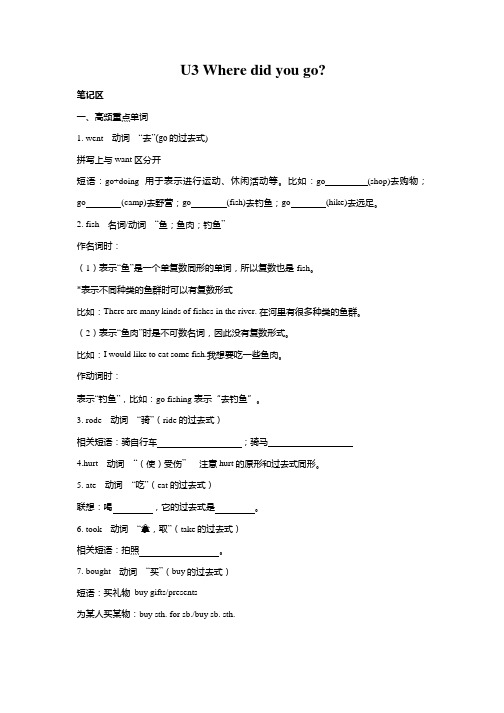
U3 Where did you go?笔记区一、高频重点单词1.went 动词“去”(go的过去式)拼写上与want 区分开短语:go+doing 用于表示进行运动、休闲活动等。
比如:go (shop)去购物;go (camp)去野营;go (fish)去钓鱼;go (hike)去远足。
2.fish 名词/动词“鱼;鱼肉;钓鱼”作名词时:(1)表示“鱼”是一个单复数同形的单词,所以复数也是fish。
*表示不同种类的鱼群时可以有复数形式比如:There are many kinds of fishes in the river. 在河里有很多种类的鱼群。
(2)表示“鱼肉”时是不可数名词,因此没有复数形式。
比如:I would like to eat some fish.我想要吃一些鱼肉。
作动词时:表示“钓鱼”,比如:go fishing 表示“去钓鱼”。
3.rode 动词“骑”(ride 的过去式)相关短语:骑自行车;骑马4.h urt 动词“(使)受伤”注意hurt 的原形和过去式同形。
5.ate 动词“吃”(eat 的过去式)联想:喝,它的过去式是。
6.took 动词“拿,取”(take 的过去式)相关短语:拍照。
7.bought 动词“买”(buy 的过去式)短语:买礼物buy gifts/presents为某人买某物:buy sth. for sb./buy sb. sth.8.gift 名词“礼物”gift 是一个可数名词,因此它的复数是:。
同表示“礼物”的还有present。
二、次频单词1.fell 动词摔倒(fall 的过去式)2.off 介词从(某处)落下3.mule 名词骡子4.beach 名词海滩在海滩:on the beach5.could 情态动词能够(can 的过去式)6.till 连词直到7.licked 舔(lick 的动词过去式)8.basket 名词篮子9.part 名词短语:一部分a part ofughed 动词过去式笑(原型laugh)三、重点句型1.What happened? 怎么了?2.Are you right?你还好吧?3.I’m OK now. 我现在沒事了。
PEP小学英语六年级下册Unit3单元整体教学设计

PEP小学英语六年级下册Unit3单元整体教学设计PEP小学英语六年级下册Unit3单元整体教学设计一、教学目标知识与技能:1.掌握表示颜色的单词。
2.学习表达“穿”衣服的动词。
3.了解并掌握一些常见的穿衣搭配。
情感态度与价值观:1.培养学生的团队合作意识。
2.让学生学会感恩生活,并感受到彼此之间的爱与关爱。
二、教学重点掌握表示颜色的单词,学习表达“穿”衣服的动词。
三、教学难点了解并掌握一些常见的穿衣搭配。
四、教学内容1. 核心词汇:yellow, green, blue, black, white, yellow pants, blue shirt, green cap, black shoes, white socks, wear, clothes。
2. 重点句式:I’m wearing a green cap and black shoes.She is wearing a blue shirt and yellow pants.What color is your cap?What are you wearing today?五、教学方法采用任务式教学法,学生在团队合作的情境中完成任务,让学生在情景中理解单词和句型的含义并能够流利使用。
同时采用游戏、歌曲、口语交际等多种教学方式,丰富教学内容,提高课堂趣味性。
六、教学流程Step 1:Warm-up开场播放Let's learn一课关于颜色的学习flash,学生跟读,复习颜色词汇。
Step 2:Presentation and practice1. Presentation(1)Teacher wears different clothes and ask students to make sentences in the form of "I'm wearing...". For example, teacher wears a red hat and green shoes, then teacher says "I'm wearing a red hat and green shoes", then ask students to repeat. And helps students to learn the phrase “I’m wearing...”。
pep六年级英语下册知识点总结
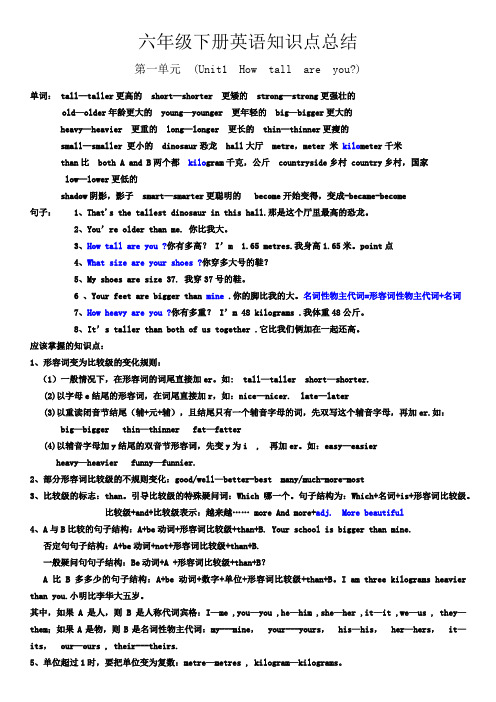
六年级下册英语知识点总结第一单元(Unit1 How tall are you?)单词: tall—taller更高的short—shorter 更矮的strong—strong更强壮的old—older年龄更大的young—younger 更年轻的big—bigger更大的heavy—heavier 更重的long—longer 更长的thin—thinner更瘦的small—smaller 更小的 dinosaur恐龙 hall大厅 metre,meter 米kilo meter千米than比 both A and B两个都 kilo gram千克,公斤 countryside乡村 country乡村,国家low—lower更低的shadow阴影,影子 smart—smarter更聪明的 become开始变得,变成-became-become句子: 1、That's the tallest dinosaur in this hall.那是这个厅里最高的恐龙。
2、You’re older than me. 你比我大。
3、How tall are you ?你有多高? I’m 1.65 metres.我身高1.65米。
point点4、What size are your shoes ?你穿多大号的鞋?5、My shoes are size 37. 我穿37号的鞋。
6 、Your feet are bigger than mine .你的脚比我的大。
名词性物主代词=形容词性物主代词+名词7、How heavy are you ?你有多重? I’m 48 kilograms .我体重48公斤。
8、It’s taller than both of us together .它比我们俩加在一起还高。
应该掌握的知识点:1、形容词变为比较级的变化规则:(1)一般情况下,在形容词的词尾直接加er。
如: tall—taller short—shorter.(2)以字母e结尾的形容词,在词尾直接加r,如:nice—nicer. late—later(3)以重读闭音节结尾(辅+元+辅),且结尾只有一个辅音字母的词,先双写这个辅音字母,再加er.如:big—bigger thin—thinner fat—fatter(4)以辅音字母加y结尾的双音节形容词,先变y为i , 再加er。
新pep版六年级英语下册课本重点词汇句型中英文对照复习资料
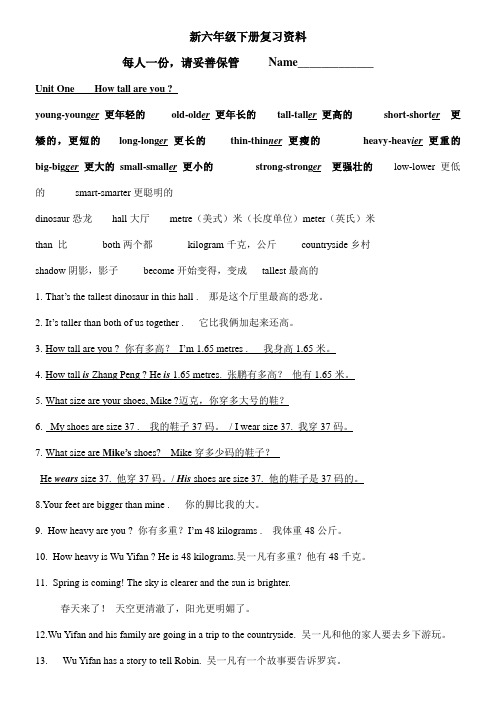
新六年级下册复习资料每人一份,请妥善保管Name_____________Unit One How tall are you ?young-young er更年轻的old-old er更年长的tall-tall er更高的short-short er 更矮的,更短的long-long er更长的thin-thin ner更瘦的heavy-heav ier更重的big-big ger 更大的small-small er更小的strong-strong er更强壮的low-lower 更低的smart-smarter更聪明的dinosaur恐龙hall大厅metre(美式)米(长度单位)meter(英氏)米than 比both两个都kilogram千克,公斤countryside乡村shadow阴影,影子become开始变得,变成tallest最高的1.That’s the tallest dinosaur in this hall . 那是这个厅里最高的恐龙。
2.It’s taller than both of us together . 它比我俩加起来还高。
3.How tall are you ? 你有多高?I’m 1.65 metres . 我身高1.65米。
4.How tall is Zhang Peng ? He is 1.65 metres. 张鹏有多高?他有1.65米。
5.What size are your shoes, Mike ?迈克,你穿多大号的鞋?6.My shoes are size 37 . 我的鞋子37码。
/ I wear size 37. 我穿37码。
7.What size are Mike’s shoes? Mike穿多少码的鞋子?He wears size 37. 他穿37码。
/ His shoes are size 37. 他的鞋子是37码的。
8.Your feet are bigger than mine . 你的脚比我的大。
PEP小学英语六年级下册第三单元教案
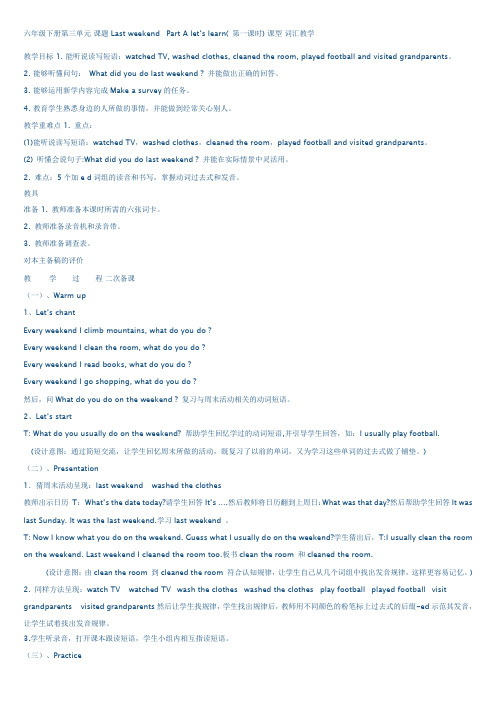
六年级下册第三单元课题 Last weekend Part A let’s learn( 第一课时) 课型词汇教学教学目标 1. 能听说读写短语:watched TV, washed clothes, cleaned the room, played football and visited grandparents。
2. 能够听懂问句:What did you do last weekend ? 并能做出正确的回答。
3. 能够运用新学内容完成Make a survey的任务。
4. 教育学生熟悉身边的人所做的事情,并能做到经常关心别人。
教学重难点 1. 重点:(1)能听说读写短语:watched TV,washed clothes,cleaned the room,played football and visited grandparents。
(2) 听懂会说句子:What did you do last weekend ? 并能在实际情景中灵活用。
2. 难点:5个加e d词组的读音和书写,掌握动词过去式和发音。
教具准备 1. 教师准备本课时所需的六张词卡。
2. 教师准备录音机和录音带。
3. 教师准备调查表。
对本主备稿的评价教学过程二次备课(一)、Warm up1、Let’s chantEvery weekend I climb mountains, what do you do ?Every weekend I clean the room, what do you do ?Every weekend I read books, what do you do ?Every weekend I go shopping, what do you do ?然后,问What do you do on the weekend ? 复习与周末活动相关的动词短语。
2、Let’s startT: What do you usually do on the weekend? 帮助学生回忆学过的动词短语,并引导学生回答,如:I usually play football.(设计意图:通过简短交流,让学生回忆周末所做的活动,既复习了以前的单词,又为学习这些单词的过去式做了铺垫。
小学英语PEP六年级下册三四单元知识点归纳复习

Unit 3 Where did you go?一、词汇went (go的过去式)去camp 野营went camping (尤指在假日)野营fish钓鱼;捕鱼went fishing 去钓鱼rode (ride的过去式)骑(马;自行车)hurt (hurt的过去式)(使)受伤ate (eat的过去式)吃took (take的过去式)拍照took pictures 照相bought (buy的过去式)买gift礼物fell (fall的过去式)摔倒off从(某处)落下Labour Day 劳动节mule 骡子Turpan 吐鲁番could (can的过去式)能till 直到beach海滩;沙滩basket 篮;筐part 角色licked (lick的过去式)舔laughed (laugh的过去式)笑二、句子1.-- What happened?怎么了?--I fell off my bike and hurt my foot.我从自行车上摔下来了,弄伤了我的脚。
2.-- Are you all right?你还好吧?--Yes, Tm OK. Thanks.是的,我没事了。
谢谢。
3.Oh dear!哦,天啊!4.-- Did you go to Turpan?你去吐鲁番了吗?--Yes, I did.是的,我去了。
5.-- Who did you go with?你和谁一起去的?--My parents and my uncle.我父母和我叔叔。
6.That's too bad!那太糟糕了!e and look at my photos from the Labour Day holiday. 来看我劳动节假期的照片吧。
8.-- Where did you go?你去哪了?--Mt. Tianshan, Xinjiang. I rode a horse.新疆的天山。
我骑马了。
9.-- Where did you go over the winter holiday?在寒假期间你去了哪里?--My family and I went to Sanya.我和我的家人去了三亚。
PEP小学六年级英语下册第三单元重点句型及词汇
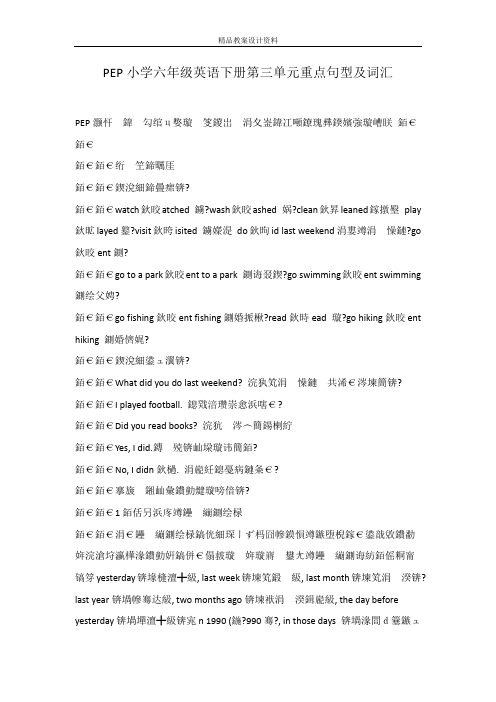
PEP小学六年级英语下册第三单元重点句型及词汇PEPц銆€銆€銆€銆€鍥涗細鍗曡瘝锛?銆€銆€watch鈥晈atched 鐪?wash鈥晈ashed 娲?clean鈥昪leaned鎵撴壂play 鈥昿layed鐜?visit鈥晇isited 鐪嬫湜do鈥昫id last weekend?go 鈥晈ent鍘?銆€銆€go to a park鈥晈ent to a park 鍘诲叕鍥?go swimming鈥晈ent swimming 鍘绘父娉?銆€銆€go fishing鈥晈ent fishing鍘婚挀楸?read鈥時ead 璇?go hiking鈥晈ent hiking 鍘婚儕娓?銆€銆€鍥涗細鍙ュ瀷锛?銆€銆€What did you do last weekend? ?銆€銆€I played football. 鎴戣涪瓒崇悆浜嗐€?銆€銆€Did you read books?銆€銆€Yes, I did.?銆€銆€No, I didn鈥檛. 涓嶏紝鎴戞病鏈夈€??銆€銆€1镐笌yesterday锛堟槰澶╋級, last week, last month? last year锛堝幓骞达級, two months ago, the day before yesterday锛堝墠澶╋級锛宨n 1990 (鍦?990骞?, in those days 锛堝湪閭d簺鏃ュ?銆€銆€濡傦細I was born in 1990. (鎴戝嚭鐢熷湪1990骞?銆?銆€銆€When did you go to the park?銆?銆€銆€I went to the park last week.e鎬併€?銆€銆€锛?锛塀e ?e鍔ㄨ瘝锛?am is 鐨勮繃鍘诲紡涓簑as; are鐨勮繃鍘诲紡涓簑ere.銆€銆€鏋勬垚锛氳偗瀹氬彞锛氫富璇?was (were) +銆€銆€濡傦細I was late yesterday. 锛堟槰澶╂垜杩熷埌浜嗐€傦級+was (were) +not+銆€銆€濡傦細We weren't late yesterday. (鎴戜滑鏄ㄥぉ娌¤繜鍒?銆€銆€鐤戦棶鍙ワ細Was (Were) ++銆€銆€濡傦細Were you ill yesterday? 锛堜綘鏄ㄥぉ鐥呬簡鍚楋紵锛??Yes, I was. (?銆€銆€鍚﹀畾鍙ワ細No, I wasn't. (涓嶏紝鎴戞病鐥呫€?銆€銆€鐗规畩鐤戦棶鍙ワ細鐗规畩鐤戦棶璇?was (were) ++銆€銆€濡傦細When were you born? 浣犳槸浠€涔堟椂鍊欏嚭鐢熺殑锛?銆€銆€锛??瑕佷娇鐢ㄥ姪鍔ㄨ瘝do鍜?does 鐨勮繃鍘诲紡did.?鍔ㄨ瘝杩囧幓寮?銆€銆€濡傦細I went home at nine o'clock yesterday.锛堟垜鏄ㄥぉ涔濈偣閽熷+didn't +鍔ㄨ瘝鍘熷舰+銆€銆€濡傦細I didn't go home yesterday. (?銆€銆€鐤戦棶鍙ワ細Did ++鍔ㄨ瘝鍘熷舰+銆€銆€濡傦細Did you go home yesterday? (浣犳槰澶╁洖瀹朵簡鍚楋紵)?Yes, I did. (?銆€銆€鍚﹀畾鍥炵瓟锛歂o, I didn't. (?銆€銆€锛?锛夊姪鍔ㄨ瘝鍜屾儏鎬佸姩璇嶈繃鍘诲紡濡備笅锛?銆€銆€shall锟紻shouldО鍗曟暟銆€銆€will锟紻would锛堝皢瑕侊級鐢ㄤ簬鎵€鏈変汉绉?銆€銆€can ?could锛堣兘锛屼細锛?may锟紻might锛堝彲浠ワ級must锟紻must 锛堝繀椤伙級銆€銆€have to锟紻had to锛堜笉寰椾笉锛??銆€銆€濡傦細I had to do my homework yesterday. (鏄ㄥぉ鎴戜笉寰椾笉鍋氫綔涓氥€?銆€銆€锛?紡琛ㄧず銆傚ぇ澶氭d鏋勬垚銆傝繖绫诲姩璇嶇О?銆€銆€1锛?ed銆?濡傦細play锟紻played work锟紻worked銆€銆€2锛?. 濡傦細like--- liked love锟紻loved 銆€銆€3锛?浠ヨ緟闊冲瓧姣?Y缁撳熬鐨勫姩璇嶏紝鍙榊涓篒锛屽啀鍔爀d. 濡傦細study锟紻studied carry锟紻carried銆€銆€4锛?浠ラ噸璇婚棴闊宠妭ed. 濡傦細stop锟紻stopped銆€銆€锛?锛?-ed銆€銆€1锛?鍦ㄦ竻杈呴煶鍚庨潰璇籟t].銆€銆€2锛?鍦ㄦ祳杈呴煶鎴栧厓闊冲悗璇籟d].銆€銆€3锛?鍦╗t] 鍜孾d] [id].銆€銆€锛? d 缁撳熬鐨勮繃鍘诲紡锛岀О涓轰笉瑙勫垯鍔ㄨ瘝銆??銆€銆€銆愭妧宸?ould锛寃ould锛宻hould绛夋椂锛屽彲鐩存帴鍦ㄥ叾鍚庨潰鍔爊ot鏋勬垚鍚﹀畾鍙ャ€備緥濡傦細銆€銆€I could get you a concert ticket. 鈫?I could not / couldn't get you a concert ticket.銆€銆€銆愭妧宸?as锛寃ereュ湪鍏跺悗鍔爊ot鏋勬垚鍚﹀畾鍙ャ€備緥濡傦細銆€銆€I was on the Internet when you called me. 鈫?I was not / wasn't on the Internet when you called me.銆€銆€銆愭妧宸?佺郴鍔ㄨ瘝was, were did not / didn't锛屽姩璇嶈繕鍘燂紝鏋勬垚鍚﹀畾鍙ャ€備緥濡傦細銆€銆€The famous singer sang some Chinese songs. 鈫?The famous singer did not / didn't sing any Chinese songs.銆€銆€銆愭妧宸?銆戠Щwas锛寃ere, could锛寃ould锛宻hould绛夌Щ鍒板彞棣栥€備緥濡傦細銆€銆€He could pack his things himself. 鈫?Could he pack his things himself?銆€銆€銆愭妧宸?銆戞坊鍔犲姪鍔ㄨ瘝did佸姪鍔ㄨ瘝銆佺郴鍔ㄨ瘝was, were燿id锛屽姩璇嶈繕鍘熴€備緥濡傦細銆€銆€Mr Li looked very old. 鈫?Did Mr Li look very old?銆€銆€涓夊彉锛氶檲杩板彞鍙樹负鐗规畩鐤戦棶鍙?銆€銆€銆愭妧宸?who / whom锛岀墿what锛屽湴鐐箇here锛屾椂闂磜hen / what time锛屽師鍥爓hy ow often锛岄暱ow long锛岃窛绂籬ow far绛夌瓑銆備緥濡傦細銆€銆€They gave the concert last night. 鈫?When did they give the concert?銆€銆€銆愭妧宸?銆戣鲸璁ょ粨鏋勫舰寮忥細鐤戦棶璇?鎯呮€佸姩璇?鍔╁姩璇? was / were / did ++...? ?銆€銆€The accident happened near the station. 鈫?Where did the accident happen?銆€銆€2銆佸叧浜庡悕璇嶆墍鏈夋牸锛氾紙浠呴檺浜庡皬瀛﹂樁娈?'s鎵€鏈夋牸鐨勭敤娉曪級銆€銆€锛??s銆備緥濡傦細銆€銆€銆€銆€Jim's bed 鍚夌背鐨勫簥銆€銆€銆€銆€the man's wife ?銆€銆€銆€銆€children's toys銆€銆€銆€銆€the fox's tail 鐙愮嫺鐨勫熬宸?銆€銆€锛?锛変互-es鎴?s缁撳熬鐨勫悕璇嶆湯灏惧姞"'s"銆備緥濡傦細銆€銆€銆€銆€the students' books ?銆€銆€銆€銆€Teachers' Day 鏁欏笀鑺?銆€銆€銆€銆€my boss' office銆€銆€銆€銆€a girls' dormitory 濂崇敓瀹胯垗銆€銆€锛?锛夎〃绀轰袱鑰呭叡鍚屾嫢鏈夌殑浜烘垨鐗?鍏辨湁)'s(鎴?)灞炲叧绯?鍚勮嚜鎵€鏈?锛屽垯姣忎釜鍚嶈瘝璇嶅熬閮藉姞涓?s(鎴?)銆備緥濡傦細銆€銆€銆€銆€Joan and Jane's room(鎴块棿灞炰簩浜哄叡鍚屾墍鏈?銆€銆€銆€銆€Joan's and Jane's room(鎸嘕oan鍜孞ane鍚勮嚜鐨勬埧闂?銆€銆€锛?锛?s?銆€銆€1)銆€銆€銆€銆€I met her at the doctor's(office).? 銆€銆€銆€銆€He has gone to the tailor's(shop).? 銆€銆€銆€銆€She went to Mr. Black's (house)yesterday.濂规槰澶╁埌甯冭幈?銆€銆€2)銆€銆€銆€銆€Whose pen is this? It's Tom's.杩欐槸璋佺殑閽㈢瑪锛熸槸姹ゅ?銆€銆€銆€銆€The bike is not mine, but Wang Pinpin's.帇鍝佸搧鐨勩€?銆€銆€3銆乼hem涓巘heir锛?them?I want to help them. ?theirх墿涓讳唬璇嶏紝鏀惧湪鍚嶈瘝鍓嶉潰銆俆hese are their books.杩欐槸浠栦滑鐨勪功銆?。
小学六年级英语第三单元
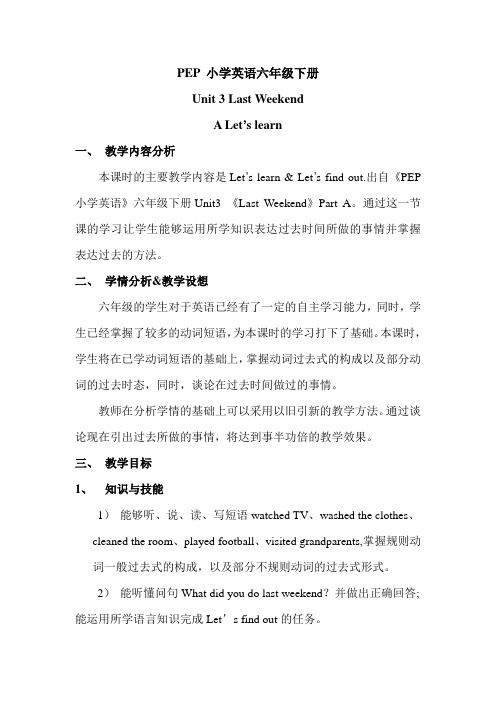
PEP 小学英语六年级下册Unit 3 Last WeekendA Let’s learn一、教学内容分析本课时的主要教学内容是Let’s learn & Let’s find out.出自《PEP 小学英语》六年级下册Unit3 《Last Weekend》Part A。
通过这一节课的学习让学生能够运用所学知识表达过去时间所做的事情并掌握表达过去的方法。
二、学情分析&教学设想六年级的学生对于英语已经有了一定的自主学习能力,同时,学生已经掌握了较多的动词短语,为本课时的学习打下了基础。
本课时,学生将在已学动词短语的基础上,掌握动词过去式的构成以及部分动词的过去时态,同时,谈论在过去时间做过的事情。
教师在分析学情的基础上可以采用以旧引新的教学方法。
通过谈论现在引出过去所做的事情,将达到事半功倍的教学效果。
三、教学目标1、知识与技能1)能够听、说、读、写短语watched TV、washed the clothes、cleaned the room、played football、visited grandparents,掌握规则动词一般过去式的构成,以及部分不规则动词的过去式形式。
2)能听懂问句What did you do last weekend?并做出正确回答; 能运用所学语言知识完成Let’s find out的任务。
2、过程与方法•通过以旧引新、创设情景帮助学生理解文本信息。
•通过多媒体创设真实情境,培养他们的听说交际能力。
•通过拓展性练习活动,培养学生语言运用的能力。
•通过小组活动,培养学生小组合作意识。
3、情感态度与价值观培养学生养成良好的生活、学习习惯。
学会用英语叙述自己做过的事情。
四、教学重难点1)重点:听说读写短语watched TV、washed the clothes、cleaned the room、played football、visited grandparents;能听说句子What did you do last weekend?并能就过去时间所做的事情进行简单回答.2)难点:学生对本课的几个短语都比较熟悉,但动词的过去式第一次出现,因此,这几个短语的动词过去式的构成及其发音是本课时的难点。
最新人教pep版小学英语毕业课本知识点单元复习第27课时六年级下册 Unit 3
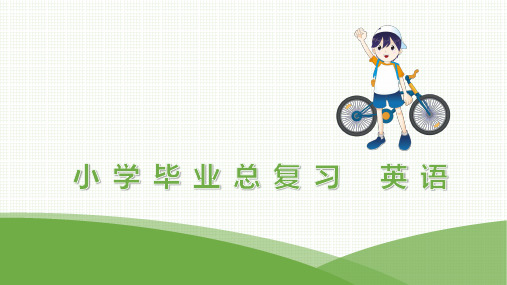
B: I ____w_e_n_t___ to Hong Kong.
2. A: Did you ___r_i_d_e____ a horse in Xinjiang?B: Yes, I ___r_o_d_e____ a horse in Xinjiang.
3. A: What did you do ____o_n_____ the Labour Day holiday?
Wu Yifan: That sounds good. Maybe (可能) we can go there together
next time.
返回目录
单元整体提升
一、Read and write.读一读,想一想,根据上下文或首字母提示写 出恰当的单词。
1. A: __W__h_e_r_e___ did you go last weekend?
B: Last night? Oh, I went to the supermarket.
3. A: I rode a bike yesterday. __D__id__y_o_u__r_id_e__a_b_i_k_e_y_e_s_t_er_d_a_y___, too?
B: No, I did homework.
返回目录
___略______________________________________________________
_________________________________________________________ _________________________________________________________ _________________________________________________________ _________________________________________________________ _________________________________________________________
六年级英语下学期(PEP人教版)全册单元知识点复习资料
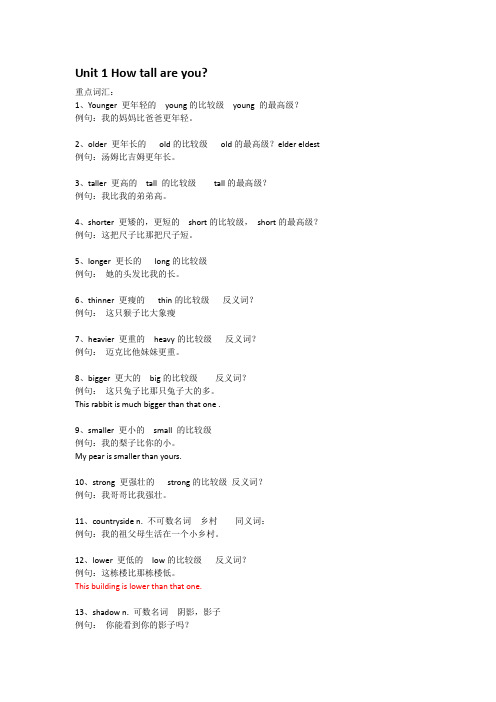
Unit 1 How tall are you?重点词汇:1、Younger 更年轻的young的比较级young 的最高级?例句:我的妈妈比爸爸更年轻。
2、older 更年长的old的比较级old的最高级?elder eldest 例句:汤姆比吉姆更年长。
3、taller 更高的tall 的比较级tall的最高级?例句:我比我的弟弟高。
4、shorter 更矮的,更短的short的比较级,short的最高级?例句:这把尺子比那把尺子短。
5、longer 更长的long的比较级例句:她的头发比我的长。
6、thinner 更瘦的thin的比较级反义词?例句:这只猴子比大象瘦7、heavier 更重的heavy的比较级反义词?例句:迈克比他妹妹更重。
8、bigger 更大的big的比较级反义词?例句:这只兔子比那只兔子大的多。
This rabbit is much bigger than that one .9、smaller 更小的small 的比较级例句:我的梨子比你的小。
My pear is smaller than yours.10、strong 更强壮的strong的比较级反义词?例句:我哥哥比我强壮。
11、countryside n. 不可数名词乡村同义词:例句:我的祖父母生活在一个小乡村。
12、lower 更低的low的比较级反义词?例句:这栋楼比那栋楼低。
This building is lower than that one.13、shadow n. 可数名词阴影,影子例句:你能看到你的影子吗?14、smarter 更聪明的smart的比较级例句:你变得越来越聪明了。
You are getting smarter and smarter.15、become v. 开始变得,变成例句:这个女孩想成为一名演员。
This girl wants to become an actress.重点短语:How tall 多高how heavy 多重how old 多大what size 多大号In this hall 在这个厅里both of 两个都over there 在那边have a look 看一看Go down 下降重点句型:①形容词的最高级:最高级通常用于3人或者3人以上的人或事物之间的比较。
PEP小学六年级英语下册复习语法知识及配套习题
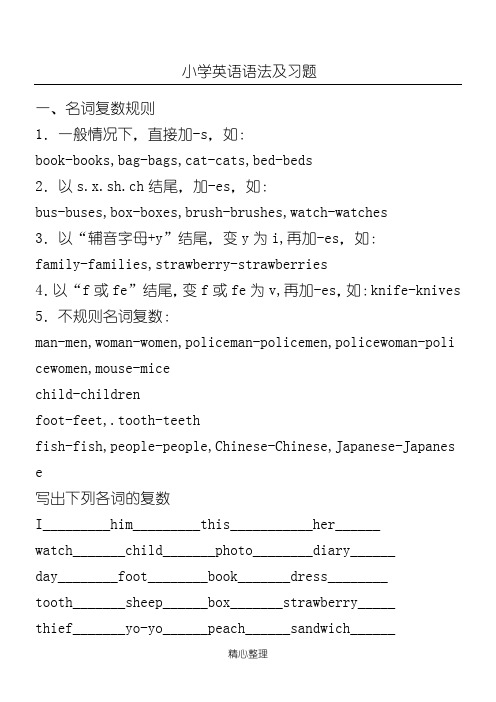
小学英语语法及习题一、名词复数规则1.一般情况下,直接加-s,如:book-books,bag-bags,cat-cats,bed-beds2.以s.x.sh.ch结尾,加-es,如:3.以4.以5eI_________him_________this___________her______ watch_______child_______photo________diary______ day________foot________book_______dress________ tooth_______sheep______box_______strawberry_____ thief_______yo-yo______peach______sandwich______man______woman_______paper_______??????juice___________ water________milk________rice__________tea__________ 二、一般现在时一般现在时基本用法介绍【No.1】一般现在时的功能或"-es"一般现在时的变化1.be动词的变化。
否定句:主语+be+not+其它。
如:Heisnotaworker.他不是工人。
一般疑问句:Be+主语+其它。
如:-Areyouastudent?-Yes.Iam./No,I'mnot.特殊疑问句:疑问词+一般疑问句。
如:Whereismybike?2.行为动词的变化。
否定句:主语+don't(doesn't)+动词原形(+其它)。
如:动词12.以s.x.sh.ch.o结尾,加-es,如:guess-guesses,wash-washes,watch-watches,go-goes3.以“辅音字母+y”结尾,变y为i,再加-es,如:study-studies 一般现在时用法专练:一、写出下列动词的第三人称单数drink________go_______stay________make________look_________have_______pass_______????carry____ come________?????watch______plant_______fly________ study_______brush________do_________????teach_______ 二、用括号内动词的适当形式填空。
(人教PEP)六年级英语下册复习资料 全册句型总结
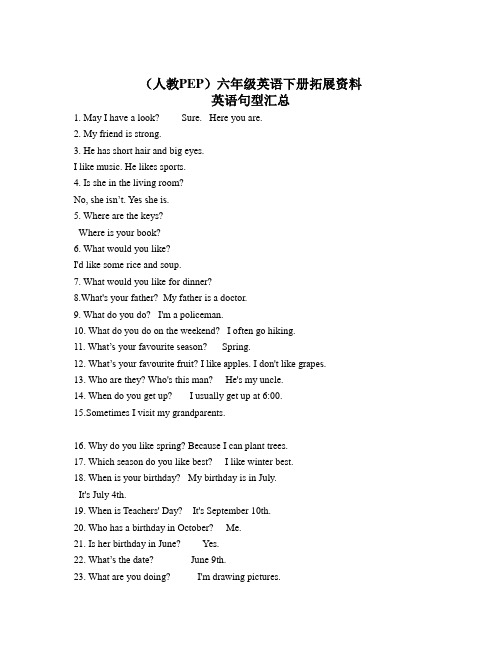
(人教PEP)六年级英语下册拓展资料英语句型汇总1. May I have a look? Sure. Here you are.2. My friend is strong.3. He has short hair and big eyes.I like music. He likes sports.4. Is she in the living room?No, she isn’t. Yes she is.5. Where are the keys?Where is your book?6. What would you like?I'd like some rice and soup.7. What would you like for dinner?8.What's your father? My father is a doctor.9. What do you do? I'm a policeman.10. What do you do on the weekend? I often go hiking.11. What’s your favourite season?Spring.12. What’s your favourite fruit? I like apples. I don't like grapes.13. Who are they? Who's this man? He's my uncle.14. When do you get up? I usually get up at 6:00.15.Sometimes I visit my grandparents.16. Why do you like spring? Because I can plant trees.17. Which season do you like best? I like winter best.18. When is your birthday? My birthday is in July.It's July 4th.19. When is Teachers' Day? It's September 10th.20. Who has a birthday in October? Me.21. Is her birthday in June? Yes.22. What’s the date? June 9th.23. What are you doing? I'm drawing pictures.24. What is your father doing? He's writing an e-mail.25. What do you see? I see two elephants.26. What are they doing? They are drinking water.27. What is Mike doing? He's watching insects.28. Where are they? They are in the woods.29. Are they catching butterflies? No, they aren't.30. They are picking up leaves. Yes, they are.31. Where is Zhang Peng? He's in the woods.32. Is he taking pictures? Yes, he is. No, he isn't. He's playing chess.33. who’s your English teacher?Mr. Carter.34. What’s he like? He's tall and strong.35. Is he quiet? No, he isn't. He's very active.36. What day is it today? It's Wednesday.37. What do you have on Thursdays?We have English, math and science on Thursdays.38. What do you do on Saturdays?I watch TV on Saturdays.39. What do you have for lunch on Mondays?We have tomatoes, tofu and fish.40. What can you do? I can sweep the floor.41. Can you make the bed? NO, I can't. Yes, I can42.There are two bedrooms, a kitchen, a bathroom and a living room.43. There is a mirror, a bed and a big closet.44. Is there a forest in the park?Yes, there is. No, there isn't.45. Are there any pandas in the mountains?No, there aren't.46. Are there any fish in the rivers?Yes, there are.47. Where is the canteen?It's on the first floor.48. What time is it?It's 5 o'clock. It's 6:30.49. It’s time to go to school.It's time for English.50. What colour is it? It's blue.51. Whose is it? It's my T-shirt.52. What’s the weather like in Beijing?It's rainy today.53. who’s that woman? She's my mother.54. Do you like peaches? Yes, I do. No, I don't.55. Nice to meet you. Nice to meet you, too.56. I have a bear. May I have a look? Sure. Here you are.57. Where is the cinema? It's next to the hospital.58. Turn left at the cinema, then go straight.It's on the left.59. What are you going to do on the weekend?I'm going to visit my grandparents this weekend.60. Where are you going this afternoon?I'm going to the bookstore.61. What are you going to buy?I'm going to buy a comic book.62.What's your hobby? I like collecting stamps.63. Does she teach English?No, she doesn't. Yes, she does.64. What does your mother do? She is a TV reporter.65. Where does she work? She works in a car company.66. What should you do then?。
新版PEP小学英语六年级下1--4单元复习资料
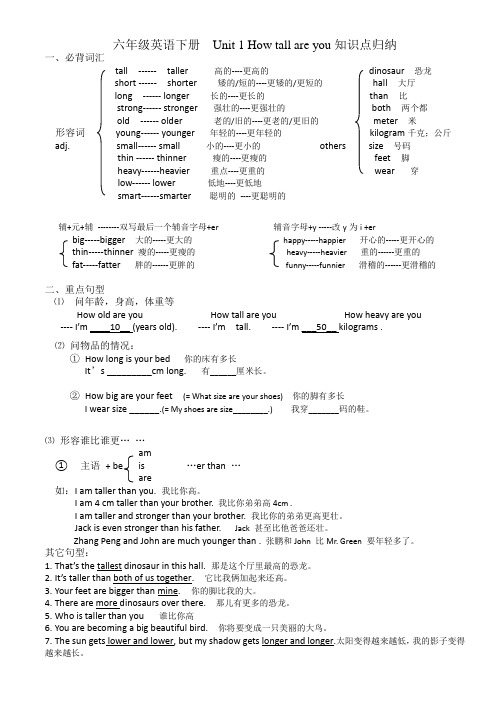
六年级英语下册Unit 1 How tall are you知识点归纳一、必背词汇tall ------ taller 高的----更高的dinosaur 恐龙short ------ shorter 矮的/短的----更矮的/更短的hall 大厅long ------ longer 长的----更长的than 比strong------ stronger 强壮的----更强壮的both 两个都old ------ older 老的/旧的----更老的/更旧的meter 米形容词young------ younger 年轻的----更年轻的kilogram千克;公斤adj. small------ small 小的----更小的others size 号码thin ------ thinner 瘦的----更瘦的feet 脚heavy------heavier 重点----更重的wear 穿low------lower低地----更低地smart------smarter聪明的----更聪明的辅+元+辅--------双写最后一个辅音字母+er 辅音字母+y -----改y为i +erbig-----bigger 大的-----更大的happy-----happier 开心的-----更开心的thin-----thinner瘦的-----更瘦的heavy-----heavier 重的------更重的fat-----fatter 胖的------更胖的funny-----funnier 滑稽的------更滑稽的二、重点句型⑴问年龄,身高,体重等How old are you How tall are you How heavy are you ---- I’m ____10__ (years old). ---- I’m tall. ---- I’m ___50__ kilograms .⑵问物品的情况:①How long is your bed你的床有多长It’s _________cm long. 有______厘米长。
PEP英语---六年级下册--第三单元--Where-did-you-go知识讲解

知识点3
如何问答身高
课文原句:—Where did you go? —Mt.Tianshan,Xinjiang.
想知道对方在过去的时间里去了哪里,我们可 以这样问答:
Where did you go(+表示过去的时间)? (I/We went to+)地点 例如: Where did you go over your holiday? Where did you go last Sunday?
Unit 3
Where did you go?
Part A (Let's try & Let's talk)
Main scene
或点击此处播放视频
点 击 图 片 , 播 放 视 频
Revision
How do you know about holidays? (你知道哪些节日假期?)
Free talk
Practice
Group work
Make a survey
A: How was your holiday? B: It was______ (cool/nice/happy). A: Where did you go? B: I went to __________. A: What did you do? B: I ____________and _________.
Name
Where
What
Exercise
按要求完成下列各题。
1.Are you all right?(作肯定回答) ____Y__e_s_, _I_a__m_.______________ 2.I hurt my leg yesterday.(根据答语写问句) ____W__h_a_t__h_a_p_p_e_n_e__d_?__________ 3.The little horse_l_o_o_k_s__li_k_e_(看起来像)a mule.(补全句子)
- 1、下载文档前请自行甄别文档内容的完整性,平台不提供额外的编辑、内容补充、找答案等附加服务。
- 2、"仅部分预览"的文档,不可在线预览部分如存在完整性等问题,可反馈申请退款(可完整预览的文档不适用该条件!)。
- 3、如文档侵犯您的权益,请联系客服反馈,我们会尽快为您处理(人工客服工作时间:9:00-18:30)。
pep六年级下册英语第三单元复习要点归纳六年级下册复习要点
第三单元
四会单词:
ath—athed 看ash—ashed 洗lean—leaned打扫pla—plaed玩visit—visited 看望d—did last eeend上一个周末g—ent去
g t a par—ent t a par 去公园g siing—ent siing去游泳
g fishing—ent fishing去钓鱼read—read 读g hiing—ent hiing 去郊游
四会句型:
hat did u d last eeend? 你上个周末干什么了?
I plaed ftball 我踢足球了。
Did u read bs? 你读书了吗?
es, I did是的,我读了。
N, I didn’t 不,我没有。
应该掌握的知识点:
1、关于一般过去时
一般过去时态:表示过去某一时间所发生的动作或存在的状态。
谓语动词要用一般过去式。
经常与esterda(昨天), last ee(上周), last nth(上个月), last ear(去年), t nths ag(两个月前), the da befre esterda (前天),in 1990 (在1990年), in thse das (在那些日子里)等表示过去的时间状语连用。
如:I as brn in 1990 (我出生在1990年)。
hen did u g t the par? (你是什么时候去的公园)。
I ent t the par last ee (我是上周去的公园)
在上面的句子中第一句属于be动词的一般过去时态;第二句和第三句属于实义动词的一般过去时态。
(1)Be 动词的一般过去时态
在没有实义动词的句子中使用be动词,a is 的过去式为as; are 的过去式为ere
构成:肯定句:主语+as (ere) +宾语
如:I as late esterda (昨天我迟到了。
)
否定句:主语+as (ere) +nt+宾语
如:e eren’t late esterda (我们昨天没迟到)
疑问句:as (ere) +主语+宾语
如:ere u ill esterda? (你昨天病了吗?)
肯定回答:es, I as (是的,我病了。
)
否定句:N, I asn’t (不,我没病。
)
特殊疑问句:特殊疑问词+as (ere) +主语+宾语
如:hen ere u brn? 你是什么时候出生的?
(2)实义动词的一般过去时态
肯定句要使用动词的过去式,否定句和疑问句要使用助动词d和des 的过去式did
肯定句为:主语+动词过去式+宾语
如:I ent he at nine ‘l esterda(我昨天九点钟回的家。
)
否定句:主语+didn’t +动词原形+宾语
如:I didn’t g he esterda (我昨天没回家。
)
疑问句:Did +主语+动词原形+宾语
如:Did u g he esterda? (你昨天回家了吗?)
肯定回答:es, I did (是的,我回了。
)
否定回答:N, I didn’t (不,我没回家。
)
(3)助动词和情态动词过去式如下:
shall― shuld(将要)用于第一人称单数
ill― uld(将要)用于所有人称
an ?uld(能,会)a― ight(可以)ust― ust (必须)
have t― had t(不得不)
助动词和情态动词的过去时态要使用他们的过去式,后面的动词还使用原形。
如:I had t d her esterda (昨天我不得不做作业。
)
(4)一般过去时态由动词的过去式表示。
大多数动词的过去式是在动词原形后加上ed构成。
这类动词称为规则动词。
1)一般情况下在词尾直接加ed。
如:pla― plaed r― red
2)以e结尾的动词只加d 如:lie--- lied lve― lved
3)以辅音字母+结尾的动词,变为I,再加ed 如:stud― studied arr― arried
4)以重读闭音节结尾的动词,如果末尾只有一个辅音字母,要
双写最后这个辅音字母,再加ed 如:stp― stpped
()--ed的读音规则如下:
1)在清辅音后面读[t]
2)在浊辅音或元音后读[d]
3)在[t] 和[d] 后读[id]
(6)不以ed 结尾的过去式,称为不规则动词。
一般过去时态的“三变”技巧
一变:肯定句变为否定句h
【技巧1】当句中含有情态动词或助动词uld,uld,shuld等时,可直接在其后面加nt构成否定句。
例如:
I uld get u a nert tiet → I uld nt / uldn’t get u a nert tiet
【技巧2】当句中含有系动词as,ere 时,可直接在其后加nt构成否定句。
例如:
I as n the Internet hen u al led e → I as nt / asn’t n the Internet hen u alled e
【技巧3】当句中谓语是除情态动词、助动词、系动词as, ere以外的动词时,在该动词之前加did nt / didn’t,动词还原,构成否定句。
例如:
The faus singer sang se hinese sngs → The faus singer did nt / didn’t sing an hinese sngs
二变:陈述句变为一般疑问句
【技巧1】移动词语的位置。
将as,ere, uld,uld,shuld等移到
句首。
例如:
He uld pa his things hiself → uld he pa his things hiself?
【技巧2】添加助动词did。
谓语是除情态动词、助动词、系动词as, ere以外的动词时,在主语之前加did,动词还原。
例如:r Li led ver ld → Did r Li l ver ld?
三变:陈述句变为特殊疑问句
【技巧1】确定疑问词:人h / h,物hat,地点here,时间hen / hat tie,原因h,频率h ften,长度h lng,距离h far等等。
例如:The gave the nert last night → hen did the give the nert?
【技巧2】辨认结构形式:疑问词+情态动词/助动词/ as / ere / did +主语+? 例如:
The aident happened near the statin → here did the aident happen?
2、关于名词所有格:(仅限于小学阶段‘s所有格的用法)
(1)表示有生命的东西的名词末尾加’s。
例如:
i’s bed 吉米的床
the an’s ife 那个男人的妻子
hildren’s ts 孩子们的玩具
the fx’s tail 狐狸的尾巴
(2)以-es或-s结尾的名词末尾加”‘s”。
例如:
the students’ bs 学生们的书
Teahers’ Da 教师节
bss’ ffie 我老板的办公室
a girls’ dritr 女生宿舍
(3)表示两者共同拥有的人或物(共有)时,只需要后一个名词加’s(或’)即可。
如果表示两者各自的所属关系(各自所有),则每个名词词尾都加上’s(或’)。
例如:
an and ane’s r(房间属二人共同所有)
an’s and ane’s r(指an和ane各自的房间)
(4)’s所有格所修饰的词的省略现象
1)表示诊所、店铺或某人的家等地点名词,其名词所有格后的被修饰语常常省略。
例如:
I et her at the dtr’s(ffie)我在诊所遇见了她。
He has gne t the tailr’s(shp)他到服装店去了。
She ent t r Bla’s (huse)esterda她昨天到布莱克先生家去了。
2)名词所有格所修饰的词,如果前面已经提到过,往往可以省略,以免重复。
例如:
hse pen is this? It’s T’s这是谁的钢笔?是汤姆的。
The bie is nt ine, but ang Pinpin’s这辆自行车不是我的,是王品品的。
3、the与their:the表示“他们” 是人称代词宾格,放在及物动词和介词后面做宾语。
如I ant t help the 我想帮助他们。
their“他们的”是形容词性物主代词,放在名词前面。
These are their bs这是他们的书。
